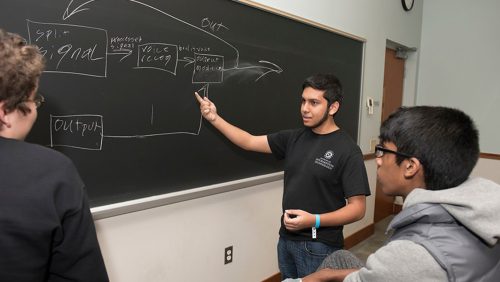As a student at Johns Hopkins, the nation’s leading research university, you’ll have opportunities that other schools simply cannot offer.
Our collaborative culture and the emphasis we place on the integration of research and education means that as an undergraduate, you’ll have the chance to conduct research and create knowledge, working side-by-side with renowned faculty from across the School of Engineering as well as with researchers and clinicians from the Johns Hopkins Schools of Medicine and Public Health.
Our stellar reputation with employers from across a wide variety of industries and the access you’ll have to our global alumni network translate into excellent with internship and career opportunities for our students.
Undergraduate Research Opportunities
Approximately 40% of computer science undergraduates elect to participate in research. Whether on the Homewood campus, the medical campus, or at the Johns Hopkins University Applied Physics Laboratory, there are so many ways to get involved.
Interested? Here are some suggestions for how to get started:
- Speak to your faculty advisor about your interest in conducting research and talk to other students about their experiences.
- Review the computer science faculty members’ bios and lab pages, identify faculty whose research interests align with yours, and get in touch with them to let them know that you want to participate in their research activities.
- Check out the many Johns Hopkins-sponsored undergraduate research opportunities.
- Explore the Department of Computer Science’s research opportunities for undergraduates:
- The Senior Honors Thesis program (Undergraduate Advising Manual).
- The Pistritto Research Fellowship—this fellowship is an application-based program that provides an annual stipend for students doing research in the area of information visualization. A call for applications is emailed to undergraduates each spring for the upcoming academic year. Fellowship recipients may choose to pursue their research during the summer or during the regular school year and in conjunction with a sponsoring faculty member.
- CS Undergraduate Research Support – students may apply for partial funding support from the CS department when conducting research with a CS faculty member. The faculty member must agree to pay 50% of the support requested. Use this form to apply.
- Visit the national Computing Research Association’s website for information about undergraduate research programs.
- Check out the NSF listing of summer Research Experiences for Undergraduates (REU) sites.
Visit the WSE Advising FAQ page for details about how to register for research, found in the Independent Academic Work section.
2024 Research Projects
Learn about the amazing research our undergraduates are pursuing this year.
Student Spotlight: Alisa Yang & Michelle Wang
The third-year computer science students partnered with Amazon Web Services to simulate the viral spread of COVID-19 in airports.
Prior Research
Learn more about previous years' undergraduate research.

